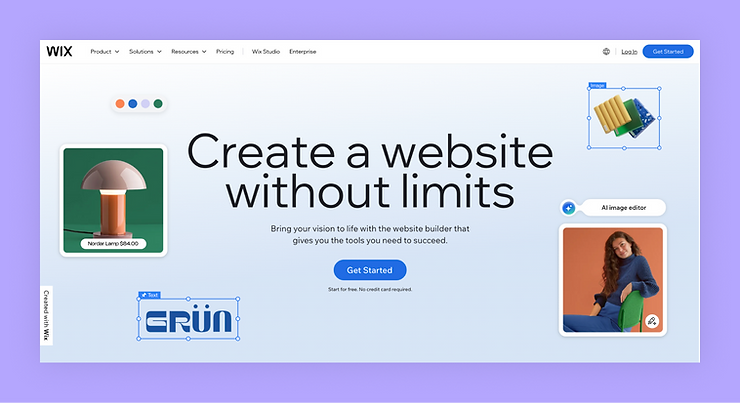- Maddy Osman
- Jan 30
- 8 min read
Updated: Mar 9
Build your website in minutes, try Wix for free today →

Are you wondering if WordPress is really the best option for your website? You're not alone. Many people turn to WordPress because it's a popular choice, but it's not the perfect fit for every need.
Perhaps you've struggled with its complexity or faced challenges managing plugins and updates. The good news is there are incredible WordPress competitors that might suit you better.
In this article, we'll explore 10 powerful options, from traditional platforms to innovative AI website builders. Whether you're looking for a simpler website builder, want better customization options or are researching how to build a website from scratch, this guide has you covered. Each option includes an overview of features, pricing and ideal use cases, so you can make an informed decision.

When choosing a website builder, you want one that’s flexible, powerful and easy-to-use. Wix is the go-to platform for millions of users looking to create a stunning website effortlessly. See what makes Wix stand out from the crowd and why it’s the right fit for you.
Why consider other website builders?
WordPress is a powerful platform, but it's not a one-size-fits-all solution. If you've ever wrestled with a steep learning curve or keeping up with the latest technical jargon, you're not alone. Many website builders offer a more streamlined, user-friendly experience—without sacrificing flexibility or functionality.
So, what makes a great alternative?
Platform | Best features |
Wix Studio | Advanced design tools, collaboration features, flexible content management |
Wix | User-friendly drag-and-drop editor, extensive app marketplace, customizable templates, SEO tools |
Ghost | Focus on content creation, powerful blogging features, built-in membership tools |
Publii | Static site generator, offline editing, no server setup needed |
Webflow | Powerful visual editor, customizable CMS, design tools |
Grav | Open-source, no database required, focus on Markdown content |
Bludit | Flat-file CMS, great for small projects, simple setup |
ProcessWire | Advanced file types, customizable content management, robust API |
OctoberCMS | Built on Laravel, flexible backend, customizable, plugin ecosystem |
Kirby | Flat-file CMS, flexible templating, easy for developer to extend |
Statamic | Flat-file CMS, flexible content structures, powerful content management |
11 best WordPress alternatives

01. Wix Studio

If you’re looking for a WordPress alternative with powerful design capabilities, built-in business solutions and AI-driven features, Wix Studio is a top choice. It’s made for professional designers and agencies who want full creative control without the hassle of managing plugins, security or hosting.
Key features:
Responsive design with extensive control over breakpoints
350+ fully customizable responsive templates for different industries
Built-in Wix Studio eCommerce features
AI-powered design and content creation with Wix Studio AI
Why Wix Studio is an alternative to WordPress: Wix Studio simplifies everything with an all-in-one platform. It simplifies design, development and collaboration with built-in tools for design, SEO and marketing.
Pricing: Plans start at $19/month (billed annually). Month-to-month plans are also available.
Learn more about Wix vs Wix Studio to find the perfect fit.
02. Wix

Building a website should be as easy—and exciting—as designing your dream space. With Wix, you can simply drag, drop and customize every detail to fit your vision with an editor that suits beginners and experienced designers alike. From SEO tools to real-time analytics, Wix helps you build, scale and optimize your website—whether it’s a basic blog or a full-fledged eCommerce store.
Key features:
Drag-and-drop website builder and AI website creator
Over 900 website templates
Built-in SEO and email marketing tools
Robust eCommerce functionality to create an online store
Wix analytics for tracking performance
Wix premium plans include website hosting, a custom domain, AI creation tools and 24/7 customer care
Robust security features with all plans, including SSL
Why Wix is an alternative to WordPress: Wix provides simplicity with its customizable and AI editors and is ideal for all types of websites. It’s an excellent choice if you want full creative freedom without the technical complexities of websites like WordPress. Wix handles hosting and website security, ensuring scalability, uptime and site reliability, making it one of the best website builders for small business enterprises.
Pricing: Free plan available. Wix premium plans start at $17/month (billed annually). Month-to-month plans are also available.
Learn more:
03. Ghost

Ghost is a modern platform for creators, publishers and businesses looking for how to make a business website or personal blog. Its simple website templates and built-in SEO tools help streamline your content. Ghost provides a user-friendly platform that helps you focus on what matters most: your content.
Key features:
Modern interface focused on content
20 free themes; 140 custom themes with paid plans
Built-in tools for SEO and analytics
Website security features, including SSL
Why Ghost is an alternative to WordPress: Ghost emphasizes its lightweight architecture and content-first web design, offering a streamlined experience, particularly for bloggers and writers.
Pricing: Get started for free. Starts at $9/month for 500 members (billed annually). Month-to-month plans are also available.
According to Esin D. Habif, product marketing lead (outbound) at Wix:
"As a creator or entrepreneur, you’re often wearing multiple hats. You’re designing the website and optimizing for SEO. This means you need a website builder that makes it easy and intuitive for you to do all those things on the same platform while still delivering results as if you were working with experts in those fields."
04. Publii

Publii is an offline content management system (CMS) for creating and managing static websites. It works for blogs, portfolios or documentation websites. This WordPress alternative offers three types of web page editors: WYSIWYG, Block and Markdown. You can host your Publii content on hosting platforms like GitHub Pages, Amazon S3, Netlify or Google Cloud or publish your content manually.
Key features:
Static website generator
Intuitive editors
13 free themes; 19 themes with paid plans
Free website hosting options
Plugins and tools, including SEO and analytics options
Why Publii is an alternative to WordPress: Publii caters to users who want static websites and is perfect for personal website builders who prioritize speed and security.
Pricing: Free to use, with optional paid integrations.
Learn more:
05. Webflow

Webflow is a visual-first, composable CMS for teams to design, build and manage websites without writing code. It’s ideal for marketers, designers and developers. The platform houses templates for multiple industries, including single-page websites across industries, making it one of the best one-page website builders on this list. Webflow ensures high website performance, scalability and hosting without plugin maintenance or software updates.
Key features:
Visual-first CMS
Over 6,000 templates
Built-in SEO, analytics and security tools
Customizable eCommerce features
AI-enabled website design
Why Webflow is an alternative to WordPress: Webflow eliminates the need for plugins or manual updates while enabling teams to collaborate, optimize and scale websites.
Pricing: Free plan available. Paid plans start at $14/month (billed annually). Month-to-month plans are also available.
Learn more: Best AI website builder.
According to Yaara Asaf, head of product at Wix Editor:
"I think the biggest game-changer is the fact that you can easily create a stunning website, and you don’t need to understand layout, design or anything to get a great working website. You can get the creative juices flowing with AI’s help and Wix’s expertise until you get exactly what you want."
06. Grav

Grav is an open-source, flat-file CMS that emphasizes speed and simplicity. Unlike traditional database-driven platforms, Grav stores data in plain text files, making it lightweight and straightforward to set up. It's suitable for blogs, portfolios, documentation sites and more. Grav uses technologies like Twig for templating and Markdown for content creation.
Key features:
Flat-file architecture
120+ themes
Plugins for online store and email tools
SEO features
Security features, including flood protection to stop brute force attacks
Why Grav is an alternative to WordPress: Grav offers a flat-file structure, eliminating the need for a database. It's a good option if you’re looking for a lightweight CMS.
Pricing: Free to use, with optional paid plugins and themes.
07. Bludit

Bludit is a flat-file CMS that stores content in JSON format, eliminating the need for a database and making it easy to create a blog, portfolio or a business website. Bludit supports Markdown and HTML, giving users flexibility in how they write and display content.
Key features:
Flat-file CMS with no database
Markdown and WYSIWYG editors
90 customizable themes
Brute force protection and SEO features included
eCommerce websites supported by plugins
Why Bludit is an alternative to WordPress: Bludit is ideal for users who prefer a lightweight CMS without the complexity of database management. It offers flexibility and ease of use for small to medium sites.
Pricing: Free, with optional paid themes and plugins.
08. ProcessWire

ProcessWire is an open-source platform for building custom, dynamic websites and applications. It emphasizes flexibility, allowing developers to create their best website designs and site structures without the limitation of templates or pre-defined setups. It’s particularly popular among developers who prioritize project customization and control.
Key features:
WYSIWYG editor
Custom fields
Flexible template and markup control
Modules to add SEO, email and online store functionality
Built-in security measures
Why ProcessWire is an alternative to WordPress: ProcessWire offers more control for developers creating bespoke websites or applications, thanks to its custom field-based structure, which makes the API easy to use.
Pricing: Free, with optional paid modules.
Learn more:
09. October CMS

October CMS is a Laravel-based content management system designed to offer simplicity and flexibility for developers and users alike. It’s a self-hosted platform suitable for creating websites of any scale, with tools that streamline development and user management. October CMS emphasizes ease of use through intuitive workflows and robust website features.
Key features:
Code-based editor
40+ free and paid themes available
Plugins marketplace for features like SEO, eCommerce, email, security and analytics
Why October CMS is an alternative to WordPress: October CMS is ideal for developers familiar with the Laravel PHP framework who want additional flexibility.
Pricing: Get your first license free for the first year. After that, or for additional licenses, it’s $29/year.
10. Kirby

Kirby is a flat-file CMS that stores content in text files instead of a database. Its folder-based architecture lets you organize pages, images and files intuitively. Kirby is ideal for developers, designers or creators who prefer complete project control and can create custom templates and configurations using PHP.
Key features:
Flat-file, WYSIWYG editor
Ability to self-make templates
SEO features through plugins
Additional plugins for analytics, enhanced security, online store and more
Why Kirby is an alternative to WordPress: Kirby eliminates the need for a traditional database, ensuring it’s lightweight and easier to manage for users seeking flexibility and control.
Pricing: Basic licenses start at $105/site.
11. Statamic

Statamic is another great Laravel-based CMS for building custom websites without relying on a database. It uses a flat-file structure, allowing developers to manage content directly in files. This makes version control and collaboration seamless and enhances security. Statamic is particularly suited for bespoke sites requiring advanced functionality, flexibility and mobile-friendly website design.
Key features:
Block-based editor
47 free and premium customizable templates
Add-ons for advanced security, SEO, analytics and eCommerce
Why Statamic is an alternative to WordPress: Statamic offers a secure, developer-friendly CMS with Laravel integration, making it a fit for complex projects.
Pricing: Free plan available. Paid licenses start at $275/site.
Learn more: How to make a website mobile-friendly.
Editor's note: The information presented in this article is true as of March 2, 2025, unless mentioned otherwise.
WordPress alternatives FAQs
What is the best WordPress alternative?
The best WordPress alternative depends on your technical skills, budget and website goals. For non-technical users, compare Wix vs Squarespace or explore other Squarespace alternatives. Consider Wix vs Shopify if you want an exclusive eCommerce solution. For developers, Statamic or ProcessWire offer flexibility and customization, while a static site generator like Publii is ideal for speed and security.